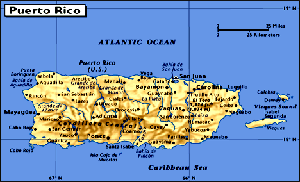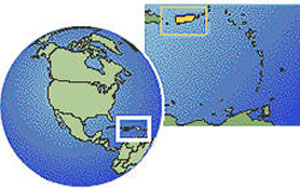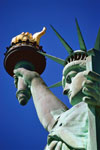Pre-Lectura
La Literatura de Inmigración de Puerto Rico a los Estados Unidos
I. Read
the following on the history of Puerto Rico and
its relationship with the United States. Explore the links for more background information. II. Next, read about the authors
of the two poems you will be reading about immigration. III. Lastly, watch
the video of a traditional song about Puerto Rico and observe the
imagery of the island.
I. La Historia

 | Puerto Rico (whose captial is San Juan) consists of the main island of Puerto Rico and various smaller islands, including Vieques, Culebra, Mona, Desecheo, and Caja de Muertos. There are also many other even smaller islands including Monito and "La Isleta de San Juan" which includes Old San Juan and Puerta de Tierra
and is connected to the main island by bridges. Puerto Rico is mostly
mountainous with large coastal areas in the north and south. The main
mountain range is called "La Cordillera Central" (The Central Range). The highest elevation in Puerto Rico, Cerro de Punta 1,339 meters (4,393 ft), is located in this range. Another important peak is El Yunque, one of the highest in the Sierra de Luquillo at the El Yunque National Forest, with an elevation of 1,065 m (3,494 ft).
The relationship between Puerto Rico and the United States has its origins dating back to the Spanish-American War, in which Spain, ceded the island to the United States. Puerto Ricans were collectively made U.S. citizens in 1917 as a result of the Jones-Shafroth Act., yet they cannot vote for the U.S. president. Since Puerto Rico is an unincorporated territory, the United States Constitution does not fully enfranchise US citizens residing in Puerto Rico. Despite their American citizenship, however, only the fundamental rights
under the federal constitution apply to Puerto Ricans. Puerto Ricans
have a long history of service in the U.S. armed forces and, since
1917, they have been included in the U.S. compulsory draft whenever it has been in effect. Since 1947, Puerto Ricans have been able to elect their own governor.
Its official languages are Spanish and English, with Spanish being the
primary language. The nature of Puerto Rico's political relationship
with the U.S. is the subject of ongoing debate in Puerto Rico, the United States Congress, and the United Nations. Specifically, the basic question is whether Puerto Rico should remain a U.S. territory, become a U.S. state, or become an independent country.
Source: Wikipedia
|
II. Fondo de las Poemas
Poema Uno - Lamento de un jíbaro
por Miguel Angel
Figueroa
Lyrics of a song composed in the traditional décima
verse form. Made up of ten-line stanzas, décima have been composed orally by
highland bards since the colonization of Puerto Rico. Recorded in the 1960s,
like many others that can be harvested from popular culture in New York, they
express the ethos of the Puerto Rican migrant to the city, the nostalgia for
their pastoral homeland, and fears of loss of language and identity. It was
recorded by its composer with a traditional ensemble of guitar, cuatro (four
double-string, higher pitched guitar), and guiro (scraping gourd), in the true
highlander style.
Source: p. 385-386 Herencia: The Anthology of Hispanic
Literature of the United States, Edited by Nicolás Kanellos
Poema Dos - Estados Unidos
por Erasmo Vando
Poet, playwright, actor, cronista, and
political activist, Erasmo Vando was born in Puerto Rico while it was still a
colony of Spain. Vando emigrated to the Southern United States as a laborer and
made his way to New York, where he became a community leader, most notably as
the president of the Puerto Rican Nationalist Youth. Vando was considered by
Bernardo Vega to be the best interpreter of the jíbaro, the Puerto Rican
campesino, on the stages of New York, and like Vega and Jesus Colon, he often
crafted his artistic and intellectual productions within that perspective. In
his poem, United States, Vando vented
the resentment that many immigrants felt at their disillusionment in the “Land
of the Free.”
Source: p. 455-457 Herencia: The Anthology of Hispanic
Literature of the United States, Edited by Nicolás Kanellos
III. Cultura En Vivo
Link to video of Puerto Rico

Source: YouTube








